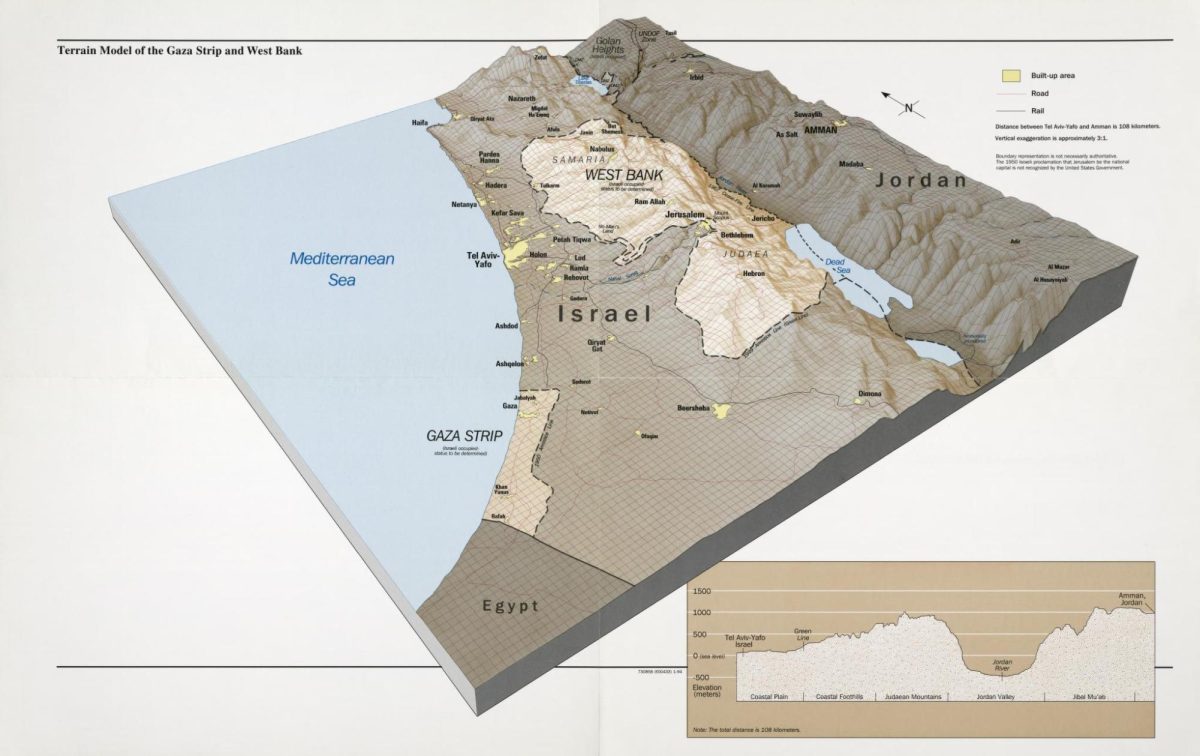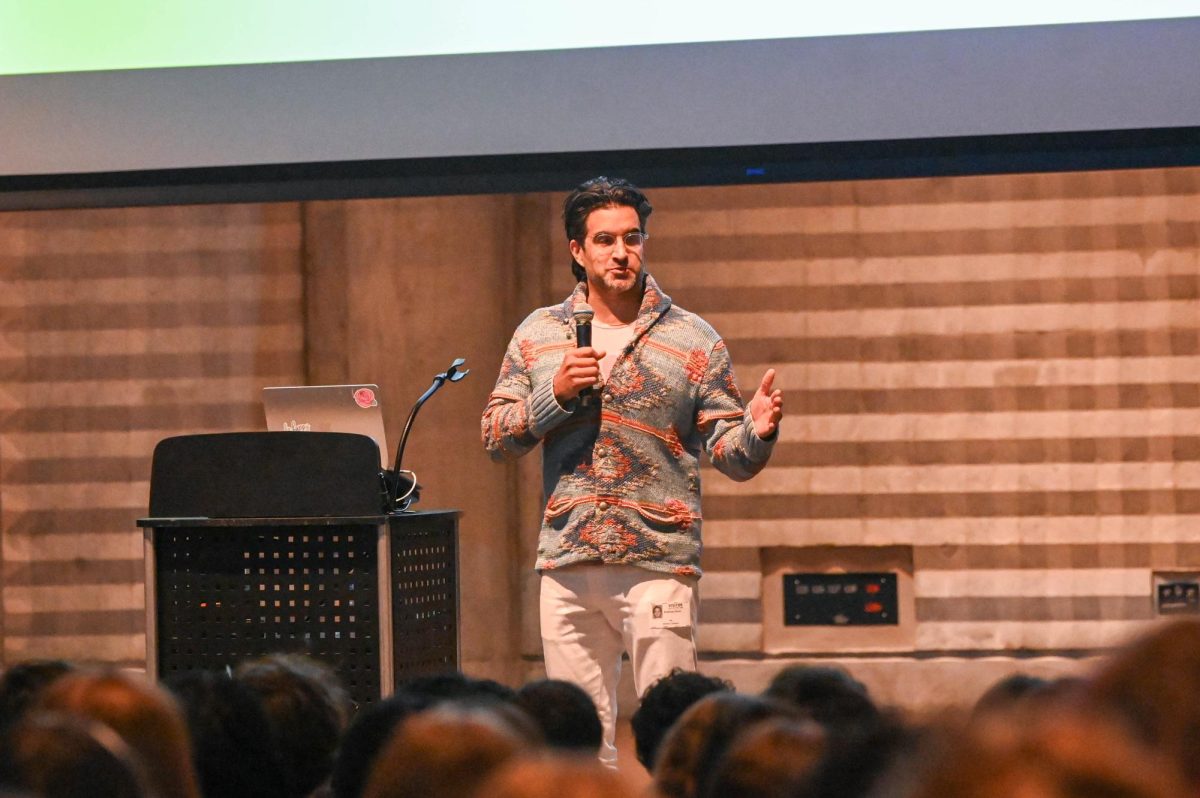After recent developments in the Israel-Hamas war, Christine Fojtik, AT Comparative Politics & Global Relations teacher, began to include informed class discussions about the conflict — assigning students to read about the complex history of the region before giving them guiding questions to address in the conversation.
“I think most of us are really upset and affected by what we’re seeing,” Dr. Fojtik said, “and I’m so impressed by the amount of curiosity and empathy I’ve seen from students, which has honestly been more impressive than I’ve seen from many adults this past week.”
The ongoing Israel-Hamas war has prompted questions about how to address the complex and multifaceted conflict both in and out of the classroom, while ensuring not to generalize and stereotype identities, and recognizing the recent surge of Islamophobia and antisemitism.
While some classes, like those taught by Dr. Fojtik, have sought to address the crisis in the Middle East, ninth grader Rania Khan said she wishes her classes talked about current events and the Israel-Hamas war more.
“A lot of people shy away from it because it can be seen as too controversial,” Rania said. “I do not think it has been brought up a lot in class, and I understand why, but I think it is valuable to hear different peoples’ perspectives because on social media it can just feed one side of the story.”
Sophomore Maya Livni, who has family in Israel, said history teachers should discuss the conflict in classrooms because of how historically rooted it is.
“It is really important for history teachers to address the topic in an unbiased way, giving the content as straight facts and then letting students form their opinions rather than leaving it to social media,” Maya said.
Maya said equating the conflict with religion creates a space that allows for antisemitism and Islamophobia.
The Shoulder to Shoulder Campaign is a multifaith coalition committed to addressing, countering and preventing Islamophobia in the United States. Executive Director Nina Fernando said in an interview with the Midway that addressing current events in the classroom, especially those involving the potential implication of stereotypes should be handled with care and sensitivity.
“We have to point out the nuances, and we cannot equate the government of Israel with all Jewish people,” Ms. Fernando said. “We cannot equate the horrible acts that Hamas has committed last week with all Muslims. It is a ridiculous thing to do, to conflate the two. To point out the real diversity that no community is a monolith is extremely important.”
Ms. Fernando said educators are responsible to facilitate and guide students in a way that allows them to ask questions but does not conflate groups of people with the acts of violence committed.
“We have to protect one another and not ask a minority student to speak on behalf of their entire community,” Ms. Fernando said. “That is very dangerous and totally unfair. We have to point to narratives that are humanizing.”
U-High science teacher Sharon Housinger has tried in the past to form a Jewish faculty affinity group, adding that the increase of antisemetic incidents in the last couple of years at Lab has caused fear and isolation among Jewish community members. She said they had difficulty finding a time to meet, but the Israel-Hamas war pushed them to finally come together.
Ms. Housinger said, “I want this to just be a place of peace where people can say, ‘We’re all upset together.’”
Ms. Fernando said with the ongoing conflict, Islamophobia and antisemitism will be on the rise, and the murder of the 6-year-old Muslim and Palestinian American boy in suburban Plainfield exemplifies this.
“Our heads are spinning, our hearts are just breaking because of the violence abroad and the rising violence we are seeing in the United States,” Ms. Fernando said. “If we are perpetuating narratives that dehumanize, it is what allows us to justify violence and it will continue with the horrible events that happened with the 6-year-old boy.”
Laboratory Schools Director Tori Jueds said she is heartened by the ways students have stepped up to support each other and leaned into learning about such a complex and troubling situation.
“What people are looking for in such a fearful and uncertain time are assurances that they belong at Lab, that they are seen and heard and valued and that they are safe,” Ms. Jueds said. “These are ongoing priorities and aspirations for our entire community that feel particularly acute at this time.”























































Gina Alicea • Oct 18, 2023 at 2:14 pm
Excellent article!
Anna Meytina • Oct 19, 2023 at 7:00 pm
I find that this article to be completely inadequate.
I want to quote from the statement of fact prepared by the Facing History project for the mini-lesson the project’s authors prepared in connection with Hamas’ attack on Israeli civilians.
“In the early hours of Saturday, October 7, 2023, Hamas fired rockets from the Gaza Strip into Israel and launched an antisemitic terrorist attack designed to murder Jews. More Jewish lives were lost on October 7, 2023 than on any one day since the Holocaust. As a result of this horrific violence, the region has now plunged into a war that will continue to cause the loss of innocent Israeli and Palestinian lives”.
Unfortunately, this article never references “antisemitic terrorist attack”, horrific violence”, and that the region is now plunged into the war as a direct result of this violence.
There can never be a “historical context” for a genocidal attack that Hamas perpetrated against the Jews. I find it disturbing that this article seem to be implying that the recent massacre was somehow just an episode of the long running conflict.
Carol Summers • Oct 25, 2023 at 5:37 pm
Israel has been committing acts of genocide against Palestinians just the same. This conflict cannot be analyzed through just the one attack you mentioned with a very obvious pro-Israel narrative. Israel took already occupied land, and it’s quite convenient that the US sides with the white population.